Answer these simple questions and we will find you the BEST prices
Which type of solar quotes do you need?
It only takes 30 seconds
100% free with no obligation

Get up to 4 quotes from our selected suppliers by filling in only 1 form

Save money by comparing quotes and choosing the most competitive offer

Our service is 100% free and with no obligation
- Market-Inspector.co.uk
- Blog
- 15 Steps to Opening a Coffee Shop
15 Steps to Opening a Coffee Shop: Business Plans, Starting Tips and Costs

Is a Coffee Shop a Good Investment?
In the UK, 95 million cups of coffee are consumed per day, which makes opening of a coffee shop a potentially great investment. At the same time, a coffee shops sells on average 200 cups per day. There are around 24,000 coffee shops across the UK and the coffee market is expanding. In fact, it is estimated that the number of coffee shops will reach 30,000 by 2025.
Small coffee shops tend to have a profit of 2.5 percent of gross sales on average. However, medium and large coffee shops might earn a higher profit. On average, a coffee shop owner can earn between £46,000 and £120,000 per year.
How Much Does It Cost to Open a Coffee Shop?
Opening a coffee shop might cost around £29,999 to £99,000. Yet, the cost of starting a coffee business depends on the location, size, style of the shop, and the equipment.
At the same time, you can buy your own coffee shop equipment or you can consider coffee machine rental, if you have a limited budget.
Below you can find an estimation of the cost of basic products and services involved in opening and running a coffee shop.
| Products/Service | Cost |
|---|---|
| Average sized coffee shop 50-60 sqm rent | £6,399 per month |
| Espresso coffee machine | £299 - £12,999 one-time cost |
| £14.99 - £40 per week | |
| Furniture | £999 - £5,000+ one-time cost |
| Dishwasher | £999 - £2,499 one-time cost |
| Bottle cooler | £599 - £1,299 one-time cost |
| Barista salary | £1,599 per month |
15 Steps to Starting up a Café
Opening your own coffee shop might be complicated and time consuming. However, this list of 15 steps will give you an idea of the most important elements of the process.
1. Study Your Coffee Competitors
Before you start brewing up coffee for your customers you should do your research about the coffee industry. Study your competitors and learn the stories of independent coffee shops owners, which might be a good inspiration. This is particularly important if you are new to the industry.
Pay attention to whether franchise or independent businesses prevail in the area you want to open your shop.
An independent coffee shop with a unique and cosy atmosphere might be able to compete with franchised shops. However, doing better than 10 distinctive cafes on the same street might be a challenge.
2. Find a Coffee Shop Concept
Finding a concept should be on the top of your checklist before opening a café because your business plan will be developed around it. A unique concept might actually determine your success in a highly competitive coffee business.
If you find a spot close to a university you should think about casual layout, and creating a student vibe. To keep students hooked to your place, consider offering cheap breakfast options.

If you find a suitable space in a business area, creating an elegant and quiet place where people can work or organise their meetings might be a good idea. On the other hand, in the areas with nurseries and schools you should think about parents’ needs such as childcare.
If your coffee shop will be located in an area where people tend to walk their dogs, an animal friendly space might be a great success.
3. Write a Solid Business Plan Before Opening a Café
A business plan is a tool that will help you organise and prioritise plans and expenses for your coffee shop. Moreover, a business plan is a must when you plan to seek a loan or get investors on board.
In your coffee shop business plan you should include:
Last but not least, you might include visual elements, for example, the shop layout and design. Graphs and charts will be helpful to present financial calculations.
A business plan can be a few or even hundreds of pages long, depending on the scale of your coffee shop. You can download our editable business plan structure.
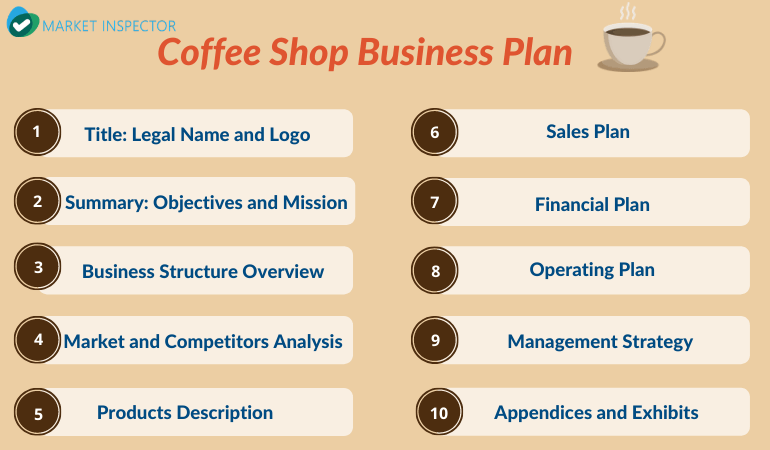
4. Find a Perfect Location for Your Café
Finding a location might be a turning point in the process of starting a café. A good location might decide about your future success. Bad location might lead a failure and huge money loss.
You might search for the location on your own or you might hire a commercial real estate agent, which might save a lot of time. However, commissions account for around 10% of annual rental fee.
While searching for a suitable location, think about the following factors: demographics, proximity to strategic places such as kindergartens, schools, universities, business district or public transportation, and competitors. Pay also attention to foot and car traffic.
A shopping mall might not necessarily be a good idea because even with a good income prospect it might not be enough to cover the high rent. Don’t disregard less obvious locations if they have good visibility. Districts that are still growing might bring you considerable income in the future.
Do not limit yourself to conventional coffee shops. Sometimes, a coffee truck located next to a train station might be better investment than a coffee shop on the main street.
Additional aspects to keep in mind are related to the shop itself. Pay attention to the plan and space. If you plan to open take-away, you will need a tiny space. However, a sit-in café will require more a spacious shop. A space with already insulating gas, and water might reduce your opening cost.
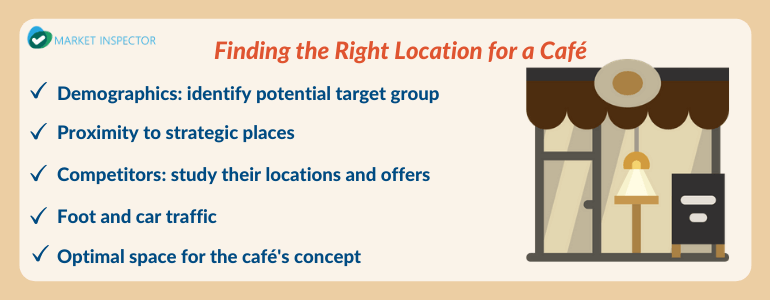
5. Know How to Finance Your Coffee Business
Starting a coffee shop might be expensive, so make sure that you have enough capital. Keep in mind that a coffee shop might first bring profit between 6 and 12 months after opening. Make sure you have enough money to cover rent, equipment, and salaries for staff for that period.
If you do not have money for opening a coffee shop, there are different ways to get funding for your business. You might consider finding an investor or getting a business loan.
How to Get a Business Loan for a Coffee Shop?
To get a loan for you coffee shop you will need a solid business plan and you need to decide what loan would be the most suitable for you.
A business start-up loan might be a good solution for those who want to maintain ownership, and need money to cover initial expenses. Besides, it helps to build business credit.
On the other hand, a small business loan might be a better solution for those who already own a business and seek an expansion.
Whatever loan you decide to apply for, make sure that you are well-prepared to get your loan approved.
6. Buy Equipment Every Coffee Shop Needs
The next step should be buying proper equipment for your coffee shop.
While there are a few commercial coffee machines that are suitable for a coffee shop, you should consider investing in an espresso machine in particular, to brew the highest quality coffee for your customers.
Depending on your individual preferences and needs, you might choose among lever commercial espresso machines, pump commercial espresso machines, pod commercial espresso machines, or steam commercial espresso machines.
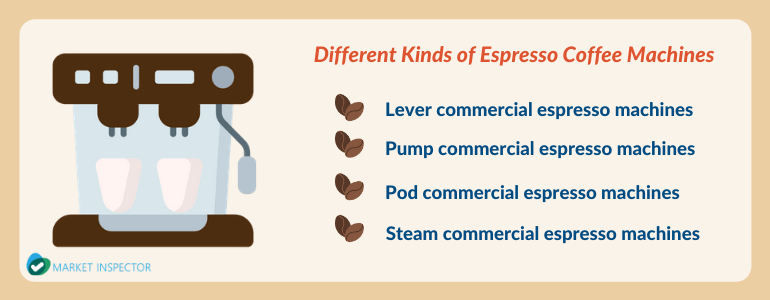
You should pay attention to both the price and the performance of your desired espresso machine. Think about the number of people you plan to serve coffee every day, and make sure that you can deliver without a delay.
There are many different coffee machine suppliers to choose from. One of the most popular coffee machines suppliers in the UK are: Franke, Fracino, Gaggia, De’longhi, Jura, Kenco, Bosch, Selecta, Astoria, Saeco, and Miele.
If your budget is limited and you cannot afford buying a machine outright, rent or leasing a coffee machine might work for the beginning of your coffee business.
7. Find the Best Quality Coffee Beans for Your Café
To hook your customers to your coffee shop, a nice location and a unique concept might not be enough. Since your main product will be coffee, you need to pay special attention to the quality of coffee beans.
Yet, the best quality coffee will cost you more. In fact, coffee beans might be one of the biggest expenses of opening a café.
There are two broad types of coffee available on the market: Coffee Arabica and Coffee Robusta. Coffee Arabica has a sweet and soft taste and high acidity, and tends to be more expensive than Robusta.
On the other hand, Robusta’s taste is stronger and harsher than Arabica. It also contains more caffeine than Arabica.
You need to think what price you should pay to create profits from sales. Keep in mind: the higher quality coffee, the higher the price of coffee in your café.
The next step is to choose how you want your coffee beans to be roasted. There are several roasts to choose from: light broad, brown, medium, dark, and extra dark.
At the same time, you might select among Amercian Roast, French Roast, Italian Roast, European Roast, and Viennese Roast. By researching the coffee market you might also learn how to blend different roast to create a unique product for your customers.
When it comes to suppliers, you might choose multi-national supplier or a local roaster. Selecting local supplier might give extra point to your business, as supporting local products.
If you care about fair trade and ethical pay, you should acquire information how your provider gets coffee. You may ask potential provider for fair trade certification.
8. Design the Interior of Your Coffee Shop
Another exciting step is to design the interior of your coffee shop. Front as well as back house plans are crucial for service efficiency and customers’ comfort. The design should be aligned with the concept you selected at the beginning of the process.
Think what kind of atmosphere you want to create. Do you want an open style of front house with bright colours, suitable for students hanging out; or maybe you want a space with darker colours to create a sense of privacy that will be appreciated by people coming to your place for a business meeting. If you target parents, think about how you will incorporate a kids corner into the layout.
Using any available space and adding decorations will depend on the size of your shop. With a small space you need to be very careful to not overwhelm your customers.
Finally, you need to think about creating a workplace that will be welcoming but also organised and efficient.
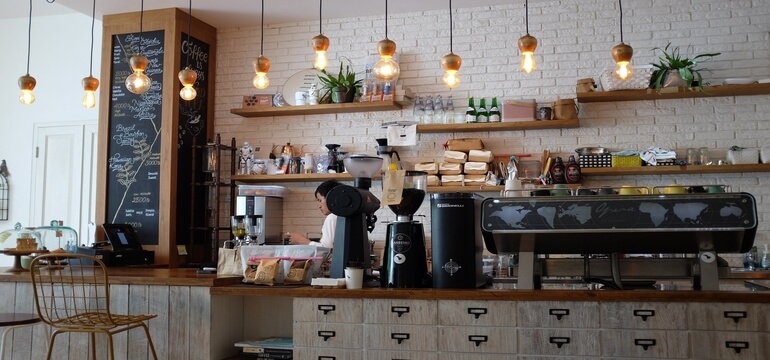
9. Find a Payment System That Works Best for Your Coffee Shop
After the creative part of designing interior, you should focus on more technical aspects of your business. Choosing the right EPOS system that works the best for a coffee shop is very important to make the operations smooth, enhance customer service, and foster the communication between front of house and back house.
A cash register will help you with the management of your business finances such as track of daily income and daily operations.
You might choose touch screen cash register, with different options, services and solutions specialized for specific sector such as restaurant or hospitality. If you want more mobile option of epos system, you might consider an mPOS system solution, which actually can be used on a tablet or smartphone if you have a good internet connection.
As with coffee machines, you have the option to buy your POS outright, or opt to rent an ePOS system.
10. Create an Online Presence for Your Coffee Shop
Online presence is extremely important for every kind of business in today’s world.
Your coffee shop needs a website so your customers can find you. It will show your customer who you are and why your coffee shop is special. Overall, through your website you can post your location, opening hours, images, and get customer reviews.
It is very easy to set up a website. However, remember that the website design cost will depend on how advanced you want your site to be. Moreover, since customers search for coffee shops on their mobile phones, make sure that you provide the best user experience by adjusting to mobile web design.
11. Spread the Word About Your Coffee Shop
Increasing the number of customers might take time. Spreading the word about your coffee shop will help you to enhance your newly created business.
Using social media is one of the best ways to showcase your coffee business to people. You can show your uniqueness and retain loyal customers. Instagram in particular might be useful, as both you and your customers can share great photos of your products.
Working with influencers can prove to be an effective way to increase the number of customers.
At the same time, video marketing might be very efficient strategy to boost your online presence. Show your audience why your coffee shop is the best.
Further, since you already have a website you might start writing a blog. Showing your passion for coffee will make people follow your coffee business journey.
Email marketing is another easy, cheap, and efficient way to reach your customer directly and make them come back. Think, for example, about inviting customers to a coffee event at your shop.
If you have allocated marketing expenses in your coffee shop budget, you can easily reach your desired audience through ads, either on social media platforms or search engines.
Finally, offering free coffee to businesses in your neighbourhood might be a great way to introduce yourself to the local community.
12. Hire Staff for Your Coffee Shop
The number of staff will depend on the size of the coffee shop and variety of products you want to offer.
Every coffee shop needs baristas to brew the main product that you are offering to your customers.
Moreover, if you plan to make and sell food you will also need a chef. Everything depends on your vision and management style.
You need to offer excellent service so your customers come back to you. For that reason, besides technical skills or willingness to learn, you should look for candidates that will represent your concept and vision of your coffee shop well.
Personality and social skills should be factors for hiring the best staff.
13. Create a Menu for Your Café
Although coffee will be the main product at your café, you can consider offering alternatives, such as food, to boost your income.
You can serve basic and typical pastries such as muffins, donuts, and croissants, which are an excellent addition to coffee. However, you need to make a decision whether you will order those products from vendors or you will prepare them in your café.
Offering a breakfast menu might be a good idea, especially if your café is located close to universities or business centres.
You should take different food preferences into consideration, and be conscious that many customers will ask for vegan and gluten-free options. Make your customers happy by offering a variety of products.
Do not stick to the same menu for the whole year. Seasonal special products will definitely make your customers spend more in your coffee shop.
For example, most coffee lovers cannot forego a pumpkin spice latte during the autumn season. Christmas season might be a perfect time for a special edition of a hot chocolate.
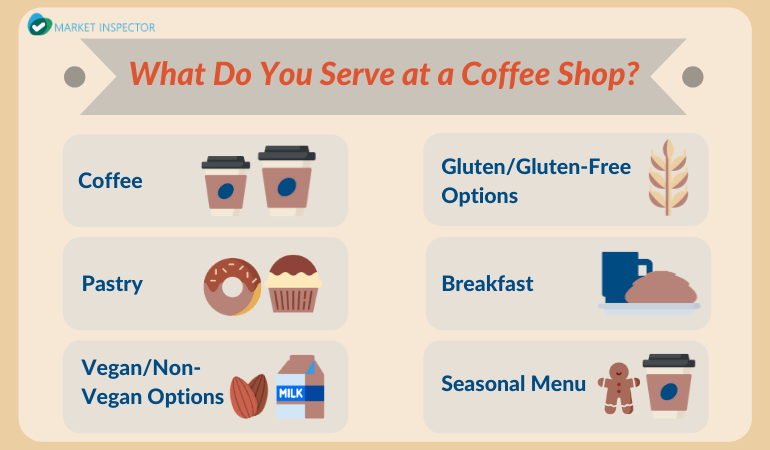
14. Get the Necessary Permits and Licences for Your Coffee Shop
When you start up your coffee shop you must get all the paperwork done before opening day.
In the UK, when you open a food business, such as a coffee shop, you are obliged to register it with local authorities. The registration is free of charge. You should do it at the latest 28 days before opening.
When your registration is done, local authorities might visit you for food hygiene inspection. You will get a rate according to the Food Hygiene Rating Scheme.
What Licenses Do You Need to Open a Coffee Shop?
To open a coffee shop you will need several licences or permits besides Food Hygiene Certificate mentioned above.
If you plan to place tables outside your coffee shop you need to check with local council whether you need a licence to do that. Different cities and towns will have different regulations and fees so it is in your best interest to check it with local authorities.
Visit The Food Standards Agency (FSA) for further information about opening a business with food and drinks.
15. Become a Coffee Expert
As a coffee shop owner you need to become a coffee nerd. You are expected to know the beans and roast you offer, as well as the brewing methods you use. When you educate yourself, you will be able to answer questions of your customers about coffee.
You might attend coffee cupping, which is a gathering to taste the flavour and aroma of coffee at different levels in the brewing process, to increase your knowledge and meet coffee experts.
Joining the British Coffee Association, which represents the coffee industry in the UK by promoting the business, talking to politicians and media to create the best conditions and culture to thrive, will definitely keep you updated about industry news
Further, you might learn about industry events such as coffee shop innovation expo or annual industry dinner.
Last but not least, you might learn a lot from Specialty Coffee Association, which hosts events, championships, and educate about coffee in the UK.

Patrycja is a Content Writer at Market Inspector. Her educational background lies in M.LL. in Law, and an MA in International Relations. She gained international experience in HR and content creation in the United Arab Emirates, Turkey, and Poland. Patrycja’s focus lies in the areas of business and technology, digital marketing, and renewable energy.
We strive to connect our customers with the right product and supplier. Would you like to be part of Market Inspector?

